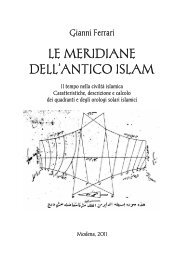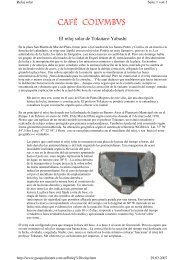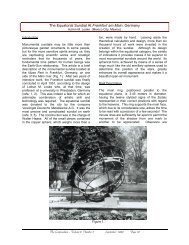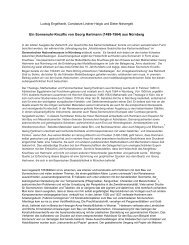International Gnomonic Bulletin - Gnomonica by Nicola Severino
International Gnomonic Bulletin - Gnomonica by Nicola Severino
International Gnomonic Bulletin - Gnomonica by Nicola Severino
Create successful ePaper yourself
Turn your PDF publications into a flip-book with our unique Google optimized e-Paper software.
SUMMER SOLSTICE CELEBRATIONS:ANCIENT AND MODERN<br />
Bruce Robinson<br />
The Summer Solstice is also known as: Alban Heflin, Alben Heruin, All-couples day,<br />
Feast of Epona, Feast of St. John the Baptist, Feill-Sheathain, Gathering Day,<br />
Johannistag, Litha, Midsummer, Sonnwend, Thing-Tide, Vestalia, etc.<br />
Overview<br />
People around the world have observed spiritual and religious seasonal days of<br />
celebration during the month of June. Most have been religious holy days which are<br />
linked in some way to the summer solstice. On this day, typically JUN-21, the daytime<br />
hours are at a maximum in the Northern hemisphere, and night time is at a minimum. It<br />
is officially the first day of summer. It is also referred to as Midsummer because it is<br />
roughly the middle of the growing season throughout much of Europe.<br />
"Solstice" is derived from two Latin words: "sol" meaning sun, and "sistere," to cause to<br />
stand still. This is because, as the summer solstice approaches, the noonday sun rises<br />
higher and higher in the sky on each successive day. On the day of the solstice, it rises<br />
an imperceptible amount, compared to the day before. In this sense, it "stands still."<br />
(In the southern hemisphere, the summer solstice is celebrated in December, also when<br />
the night time is at a minimum and the daytime is at a maximum. We will assume that<br />
the reader lives in the Northern hemisphere for the rest of this essay.)<br />
How people view solstice celebrations:<br />
People view other religions in various ways, and thus treat the celebrations of other<br />
faiths differently:<br />
For some people, religious diversity is a positive factor. They enjoy the variety of June<br />
celebrations, because it is evidence of wide range of of beliefs within our common<br />
humanity. They respect both their own religious traditions and those of other faiths for<br />
their ability to inspire people to lead more ethical lives.<br />
Others reject the importance of all celebrations other than the holy day(s) recognized<br />
<strong>by</strong> their own religion. Some even reject their religion's traditional holy days if they are<br />
convinced that they have Pagan origins. This is a common occurrence with Easter and<br />
Christmas.<br />
Some view other religions as being inspired, controlled, or even led <strong>by</strong> Satan. Thus the<br />
solstice celebrations of other religions are rejected because they are viewed as Satanic<br />
in origin.
















